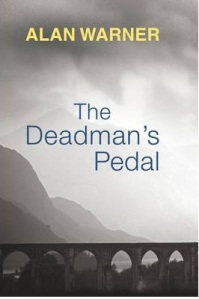Drivers or secondmen pull up their diesels expertly in the dark — the cab interior is suddenly lit yellowish — and the cab door opens; two men holding flasks or sandwich boxes and metal-cased torches step out onto a brief wooden platform with steep staircases and banisters — like some hastily assembled gallows. The city footplate men and their guard take the train southbound while the rural crew take the other train back up northward and west, over the familiar route.
Night driving, these northbound enginemen have full knowledge of the invisible road. There are no headlights on these diesels, so drivers move forward in a spectacular blindness through the starless dark, using trackside landmarks, platers’ huts or numbered bridges and viaducts to triangulate their location so the land exists in their minds more than to their senses. That ancient dark comes smothering close around the trains in the inhuman places.
The rail spur line supplies author Alan Warner with both the title of The Deadman’s Pedal (literally, it is a bar plate that the engineman must keep depressed — if he lets up, say by dying, the engine immediately stops and the train comes to a halt) and one of his story lines. Running the trains between the Port terminus and Glasgow gives him the opportunity to describe that part of the Scottish landscape; keeping them running is a community of working-class, unionized under-achievers whom Warner takes some delight in bringing to life.
He does that through dialogue and that is one of Warner’s major strengths — his only previous novel that I have read, The Stars in the Bright Sky, was an excellent illustration of that talent which left me looking forward to this novel. Longlisted for the 2010 Booker Prize, it told the unlikely story of a collection of Scot’s lassies stranded at Gatwick Airport on their way to a girls’ getaway weekend.
A second story line offers the author a different opportunity for dialogue: the central character of the novel, Simon, has just finished fifth-year school and is contemplating his future. Here are the opening paragraphs of what turns into a multi-page exchange with his mate, Andy Galbraith:
‘I’m leaving, Galbraith. I’m telling you. […] I can work with my old man any time I want to. ‘
‘Aye, aye. That’ll be right; flushing the trailers with a hose but you can’t drive a lorry till you’re eighteen.’
‘I drive lorries all the time.’
‘Aye. Round and round your old man’s garage like the dodgems; you got up to over five mile an hour yet?’ Galbraith laughed and made the strange animal sound of his. Simon noted how big and loose the shoulders of Galbraith’s school blazer still were — bought for another year’s use yet.
Galbraith said, ‘Check it out man. Nikki Caine’s down the gates there, yah jammy bass. Bet it’s you she’s waited on too. Fucking fancies you like anything, man.’
Indeed Nikki and Simon fancy each other, even though she lives in the council flats and he is the son of the town’s leading entrepreneur (his father now has ten lorries in his firm, competition for the struggling railway line). Simon has even taken Nikki up to the cave and promontory that is Simon and Galbraith’s secret hideaway.
At the early stage in the novel where this conversation takes place, Warner has already used a flashback to introduce another element that will form his third story thread: more than a decade earlier the Queen herself came to the area to name Andrew Bultitude, master of the Broken Moan estate, as the Commander of the Pass. Simon has struck up a friendship with the son of ‘the doomed family’ and through him meets the intriguing, disturbed and attractive Varie Bultitude — he soon finds himself in a teenage love-torn conflict between lower class Nikki, her worldly sister Karen and the landed aristocrat Varie.
Forbidding landscape, imprisoning class and painfully growing into maturity — those are the elements in which Warner grounds his story. Simon does decide to leave school and applies for a job as a Traction Trainee, thinking it is work at the hospital (you know, for people with broken legs) where Nikki’s older sister is a nurse but it turns out to be a train driver apprenticeship on the railway. He gets the job and, to his father’s dismay, becomes the sole member of a new generation in a working-class community of “waiting for retirement” railroaders.
The Deadman’s Pedal is not a weighty novel — mainly it is the story of how Simon struggles to adapt to the conflicts that are inherent in each of those three story threads. Warner uses that structure to develop a series of set pieces and, to his credit, delivers on most of them. The result is not so much a coming-of-age story as it is a series of observations, viewed through a young man’s eyes, on a world that time has temporarily left behind — rest assured, reality intrudes as the book moves along.
Reviews elsewhere had touted The Deadman’s Pedal as a candidate for this year’s Booker longlist; I picked it up on that basis, coupled with a grudging appreciation of The Stars in the Bright Sky, a novel that succeeded more often that it failed. I have known a few train engineers in my time, so that aspect interested me (and I wasn’t disappointed with that thread). The novel didn’t make the longlist and I can’t say I am surprised — despite that, it was a worthwhile read. Warner creates an interesting cast of very human characters and does a good job of portraying the isolated community that is their world — The Deadman’s Pedal may not be an ambitious novel, but it is a successful one.

